 W
WAdventure Story is a 1949 play by the English dramatist Terence Rattigan. The play tells the story of Alexander the Great and his conquests.
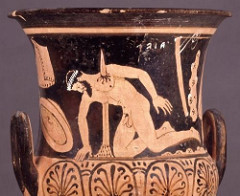 W
WSophocles' Ajax, or Aias, is a Greek tragedy written in the 5th century BC. Ajax may be the earliest of Sophocles' seven tragedies to have survived, though it is probable that he had been composing plays for a quarter of a century already when it was first staged. It appears to belong to the same period as his Antigone, which was probably performed in 442 or 441 BC, when he was 55 years old. The play depicts the fate of the warrior Ajax, after the events of the Iliad but before the end of the Trojan War.
 W
WAlcestis is an Athenian tragedy by the ancient Greek playwright Euripides. It was first produced at the City Dionysia festival in 438 BC. Euripides presented it as the final part of a tetralogy of unconnected plays in the competition of tragedies, for which he won second prize; this arrangement was exceptional, as the fourth part was normally a satyr play. Its ambiguous, tragicomic tone—which may be "cheerfully romantic" or "bitterly ironic"—has earned it the label of a "problem play." Alcestis is, possibly excepting the Rhesus, the oldest surviving work by Euripides, although at the time of its first performance he had been producing plays for 17 years.
 W
WAndromache is an Athenian tragedy by Euripides. It dramatises Andromache's life as a slave, years after the events of the Trojan War, and her conflict with her master's new wife, Hermione. The date of its first performance is unknown. Some scholars place the date sometime between 428 and 425 BC. Müller places it between 420 and 417 BC. A Byzantine scholion to the play suggests that its first production was staged outside Athens, though modern scholarship regards this claim as dubious.
 W
WAndromaque is a tragedy in five acts by the French playwright Jean Racine written in alexandrine verse. It was first performed on 17 November 1667 before the court of Louis XIV in the Louvre in the private chambers of the Queen, Marie Thérèse, by the royal company of actors, called "les Grands Comédiens", with Thérèse Du Parc in the title role. The company gave the first public performance two days later in the Hôtel de Bourgogne in Paris. Andromaque, the third of Racine's plays, written at the age of 27, established its author's reputation as one of the great playwrights in France.
 W
WAntigone is a tragedy by Sophocles written on or before 441 BC.
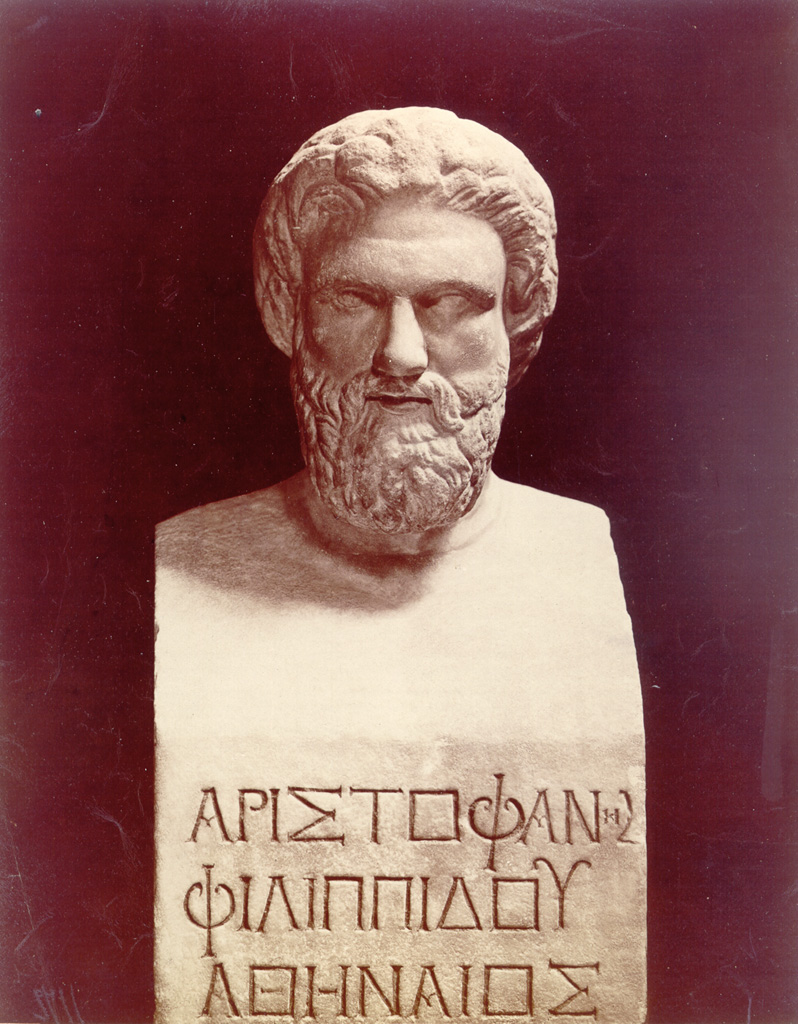 W
WAssemblywomen is a comedy written by the Greek playwright Aristophanes in 391 BC. The play invents a scenario where the women of Athens assume control of the government and instate reforms that ban private wealth and enforce sexual equality for the old and unattractive. In addition to Aristophanes' political and social satire, Assemblywomen derives its comedy through sexual and scatological humor. It is important to note that the play aimed to criticize the Athenian government at the time.
 W
WThe Bacchae is an ancient Greek tragedy, written by the Athenian playwright Euripides during his final years in Macedonia, at the court of Archelaus I of Macedon. It premiered posthumously at the Theatre of Dionysus in 405 BC as part of a tetralogy that also included Iphigeneia at Aulis and Alcmaeon in Corinth, and which Euripides' son or nephew is assumed to have directed. It won first prize in the City Dionysia festival competition.
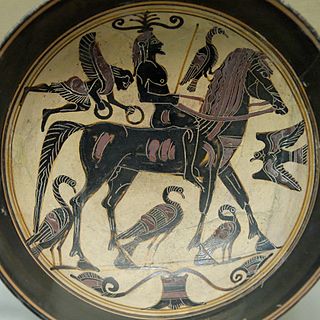 W
WThe Birds is a comedy by the Ancient Greek playwright Aristophanes. It was performed in 414 BC at the City Dionysia where it won second place. It has been acclaimed by modern critics as a perfectly realized fantasy remarkable for its mimicry of birds and for the gaiety of its songs. Unlike the author's other early plays, it includes no direct mention of the Peloponnesian War and there are few references to Athenian politics, and yet it was staged not long after the commencement of the Sicilian Expedition, an ambitious military campaign that greatly increased Athenian commitment to the war effort. In spite of that, the play has many indirect references to Athenian political and social life. It is the longest of Aristophanes' surviving plays and yet it is a fairly conventional example of Old Comedy.
 W
WThe Boys from Syracuse is a musical with music by Richard Rodgers and lyrics by Lorenz Hart, based on William Shakespeare's play The Comedy of Errors, as adapted by librettist George Abbott. The score includes swing and other contemporary rhythms of the 1930s. The show was the first musical based on a Shakespeare play. The Comedy of Errors was itself loosely based on a Roman play, The Menaechmi, or the Twin Brothers, by Plautus.
 W
WChildren of Heracles is an Athenian tragedy by Euripides that was first performed c. 430 BC. It follows the children of Heracles as they seek protection from Eurystheus. It is the first of two surviving tragedies by Euripides where the children of Heracles are suppliants.
 W
WThe Clouds is a Greek comedy play written by the playwright Aristophanes. A lampooning of intellectual fashions in classical Athens, it was originally produced at the City Dionysia in 423 BC and was not as well received as the author had hoped, coming last of the three plays competing at the festival that year. It was revised between 420 and 417 BC and was thereafter circulated in manuscript form.
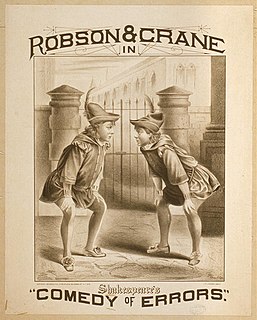 W
WThe Comedy of Errors is one of William Shakespeare's early plays. It is his shortest and one of his most farcical comedies, with a major part of the humour coming from slapstick and mistaken identity, in addition to puns and word play. The Comedy of Errors is, along with The Tempest, one of only two Shakespearean plays to observe the Aristotelian principle of unity of time—that is, that the events of a play should occur over 24 hours. It has been adapted for opera, stage, screen and musical theatre numerous times worldwide. In the centuries following its premiere, the play's title has entered the popular English lexicon as an idiom for "an event or series of events made ridiculous by the number of errors that were made throughout".
 W
WCyclops is an ancient Greek satyr play by Euripides, based closely on an episode from the Odyssey. It would have been the fourth part of a tetralogy presented by Euripides in a dramatic festival in 5th Century BC Athens. The date of its composition is unknown, but it was probably written late in Euripides' career. It is the only complete and extant satyr play.
 W
WThe Death of Empedocles is an unfinished drama by Friedrich Hölderlin. It exists in three versions written from 1797 to 1800, the first of which is the most complete. The third version was published by itself in 1826, but all three did not appear in print together until 1846, three years after Hölderlin's death.
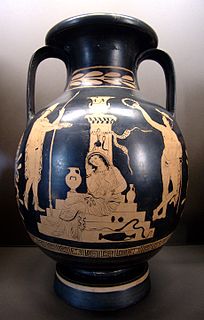 W
WEuripides' Electra is a play probably written in the mid 410s BC, likely before 413 BC. It is unclear whether it was first produced before or after Sophocles' version of the Electra story.
 W
WElectra, Elektra, or The Electra is a Greek tragedy by Sophocles. Its date is not known, but various stylistic similarities with the Philoctetes and the Oedipus at Colonus lead scholars to suppose that it was written towards the end of Sophocles' career. Jebb dates it between 420 BC and 414 BC.
 W
WEpitrepontes is an Ancient Greek comedy by Menander, of which only fragments of papyrus were preserved.
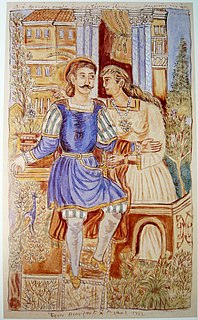 W
WErotokritos is a romance composed by Vikentios Kornaros in early 17th century Crete. It consists of 10,012 fifteen-syllable rhymed verses, the last twelve of which refer to the poet himself. It is written in the Cretan dialect of the Greek language. Its central theme is love between Erotokritos and Aretousa. Around this theme, revolve other themes such as honour, friendship, bravery and courage. Erotokritos and Erophile by Georgios Hortatzis constitute classic examples of Greek Renaissance literature and are considered to be the most important works of Cretan literature. It remains a popular work to this day, largely due to the music that accompanies it when it is publicly recited. A particular type of rhyming used in the traditional mantinades was also the one used in Erotokritos.
 W
WHecuba is a tragedy by Euripides written c. 424 BC. It takes place after the Trojan War, but before the Greeks have departed Troy. The central figure is Hecuba, wife of King Priam, formerly Queen of the now-fallen city. It depicts Hecuba's grief over the death of her daughter Polyxena, and the revenge she takes for the murder of her youngest son Polydorus.
 W
WHelen is a drama by Euripides about Helen, first produced in 412 BC for the Dionysia in a trilogy that also contained Euripides' lost Andromeda. The play has much in common with Iphigenia in Tauris, one of the playwright's later works.
 W
WHerakles is an Athenian tragedy by Euripides that was first performed c. 416 BC. While Herakles is in the underworld obtaining Cerberus for one of his labours, his father Amphitryon, wife Megara, and children are sentenced to death in Thebes by Lycus. Herakles arrives in time to save them, though the goddesses Iris and Madness (personified) cause him to kill his wife and children in a frenzy. It is the second of two surviving tragedies by Euripides where the family of Herakles are suppliants. It was first performed at the City Dionysia festival.
 W
WHercules is a musical based on the Walt Disney Animation Studios 1997 film of the same name. The music and lyrics were written by Alan Menken and David Zippel with a book by Kristoffer Diaz. The production is also loosely based on the legendary hero of the same name, the son of Zeus, in Greek mythology.
 W
WHippolytus is an Ancient Greek tragedy by Euripides, based on the myth of Hippolytus, son of Theseus. The play was first produced for the City Dionysia of Athens in 428 BC and won first prize as part of a trilogy.
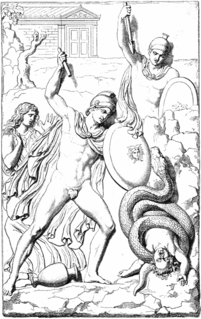 W
WHypsipyle is a partially preserved tragedy by Euripides, about the legend of queen Hypsipyle of Lemnos, daughter of King Thoas. It was one of his last and most elaborate plays. It was performed c. 411–407, along with The Phoenician Women which survives in full, and the lost Antiope.
 W
WIon is an ancient Greek play by Euripides, thought to be written between 414 and 412 BC. It follows the orphan Ion in the discovery of his origins.
 W
WIphigenia in Aulis or Iphigenia at Aulis is the last of the extant works by the playwright Euripides. Written between 408, after Orestes, and 406 BC, the year of Euripides' death, the play was first produced the following year in a trilogy with The Bacchae and Alcmaeon in Corinth by his son or nephew, Euripides the Younger, and won first place at the City Dionysia in Athens.
 W
WIphigenia in Tauris is a drama by the playwright Euripides, written between 414 BC and 412 BC. It has much in common with another of Euripides's plays, Helen, as well as the lost play Andromeda, and is often described as a romance, a melodrama, a tragi-comedy or an escape play.
 W
WIphigénie is a dramatic tragedy in five acts written in alexandrine verse by the French playwright Jean Racine. It was first performed in the Orangerie in Versailles on August 18, 1674, as part of the fifth of the royal Divertissements de Versailles of Louis XIV to celebrate the conquest of Franche-Comté. Later in December it was triumphantly revived at the Hôtel de Bourgogne, home of the royal troupe of actors in Paris.
 W
WThe Knights was the fourth play written by Aristophanes, who is considered the master of an ancient form of drama known as Old Comedy. The play is a satire on the social and political life of classical Athens during the Peloponnesian War and in this respect it is typical of all the dramatist's early plays. It is unique however in the relatively small number of its characters and this was due to its vitriolic preoccupation with one man, the pro-war populist Cleon. Cleon had prosecuted Aristophanes for slandering the polis with an earlier play, The Babylonians, for which the young dramatist had promised revenge in The Acharnians, and it was in The Knights that his revenge was exacted. The Knights won first prize at the Lenaia festival when it was produced in 424 BC.
 W
WLysistrata is an ancient Greek comedy by Aristophanes, originally performed in classical Athens in 411 BC. It is a comic account of a woman's extraordinary mission to end the Peloponnesian War between Greek city states by denying all the men of the land any sex, which was the only thing they truly and deeply desired. Lysistrata persuades the women of the warring cities to withhold sexual privileges from their husbands and lovers as a means of forcing the men to negotiate peace—a strategy, however, that inflames the battle between the sexes.
 W
WMidas is a verse drama in blank verse by the Romantic writers Mary Shelley and Percy Bysshe Shelley. Mary wrote the drama and Percy contributed two lyric poems to it. Written in 1820 while the Shelleys were living in Italy, Mary Shelley tried unsuccessfully to have the play published by children's magazines in England in the 1830s; however, it was not published until A. Koszul's 1922 scholarly edition. Whether or not the drama was ever meant to be staged is a point of debate among scholars. The play combines the stories of the musical contest between Apollo and Pan and that of King Midas and his ability to turn everything he touches to gold.
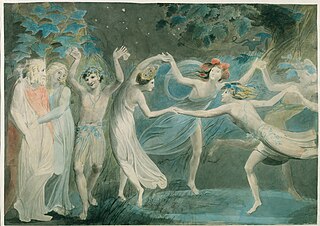 W
WA Midsummer Night's Dream is a comedy written by William Shakespeare in 1595/96. The play is set in Athens and consists of several subplots that revolve around the marriage of Theseus and Hippolyta. One subplot involves a conflict between four Athenian lovers. Another follows a group of six amateur actors rehearsing the play which they are to perform before the wedding. Both groups find themselves in a forest inhabited by fairies who manipulate the humans and are engaged in their own domestic intrigue. The play is one of Shakespeare's most popular and is widely performed.
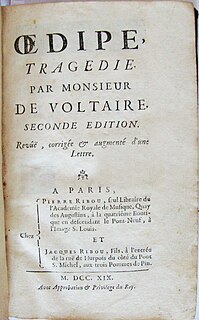 W
WOedipus is a tragedy by the French dramatist and philosopher Voltaire that was first performed in 1718. It was his first play and the first literary work for which he used the pen-name Voltaire.
 W
WOedipus at Colonus is one of the three Theban plays of the Athenian tragedian Sophocles. It was written shortly before Sophocles's death in 406 BC and produced by his grandson at the Festival of Dionysus in 401 BC.
 W
WOedipus Rex, also known by its Greek title, Oedipus Tyrannus, or Oedipus the King, is an Athenian tragedy by Sophocles that was first performed around 429 BC. Originally, to the ancient Greeks, the title was simply Oedipus (Οἰδίπους), as it is referred to by Aristotle in the Poetics. It is thought to have been renamed Oedipus Tyrannus to distinguish it from another of Sophocles's plays, Oedipus at Colonus. In antiquity, the term "tyrant" referred to a ruler with no legitimate claim to rule, but it did not necessarily have a negative connotation.
 W
WThe Oresteia is a trilogy of Greek tragedies written by Aeschylus in the 5th century BC, concerning the murder of Agamemnon by Clytemnestra, the murder of Clytemnestra by Orestes, the trial of Orestes, the end of the curse on the House of Atreus and the pacification of the Erinyes. The trilogy—consisting of Agamemnon (Ἀγαμέμνων), The Libation Bearers (Χοηφóρoι), and The Eumenides (Εὐμενίδες)—also shows how the Greek gods interacted with the characters and influenced their decisions pertaining to events and disputes. The only extant example of an ancient Greek theatre trilogy, the Oresteia won first prize at the Dionysia festival in 458 BC. The principal themes of the trilogy include the contrast between revenge and justice, as well as the transition from personal vendetta to organized litigation. Oresteia originally included a satyr play, Proteus (Πρωτεύς), following the tragic trilogy, but all except a single line of Proteus has been lost.
 W
WOrestes (408 BCE) is an Ancient Greek play by Euripides that follows the events of Orestes after he had murdered his mother.
 W
WPeace is an Athenian Old Comedy written and produced by the Greek playwright Aristophanes. It won second prize at the City Dionysia where it was staged just a few days before the Peace of Nicias was validated, which promised to end the ten-year-old Peloponnesian War. The play is notable for its joyous anticipation of peace and for its celebration of a return to an idyllic life in the countryside. However, it also sounds a note of caution, there is bitterness in the memory of lost opportunities and the ending is not happy for everyone. As in all of Aristophanes' plays, the jokes are numerous, the action is wildly absurd and the satire is savage. Cleon, the pro-war populist leader of Athens, is once again a target for the author's wit, even though he had died in battle just a few months earlier.
 W
WPericles, Prince of Tyre is a Jacobean play written at least in part by William Shakespeare and included in modern editions of his collected works despite questions over its authorship, as it was not included in the First Folio. Whilst various arguments support that Shakespeare is the sole author of the play, modern editors generally agree that Shakespeare is responsible for almost exactly half the play—827 lines—the main portion after scene 9 that follows the story of Pericles and Marina. Modern textual studies indicate that the first two acts of 835 lines detailing the many voyages of Pericles were written by a collaborator, which strong evidence suggests to have been the victualler, panderer, dramatist and pamphleteer George Wilkins.
 W
WPhèdre is a French dramatic tragedy in five acts written in alexandrine verse by Jean Racine, first performed in 1677 at the theatre of the Hôtel de Bourgogne in Paris.
 W
WPhiloctetes is a play by Sophocles. The play was written during the Peloponnesian War. It is one of the seven extant tragedies by Sophocles. It was first performed at the City Dionysia in 409 BC, where it won first prize. The story takes place during the Trojan War. It describes the attempt by Neoptolemus and Odysseus to bring the disabled Philoctetes, the master archer, back to Troy from the island of Lemnos.
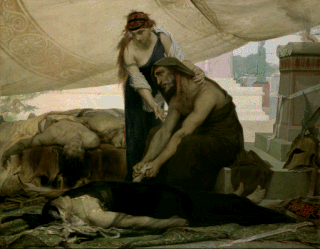 W
WThe Phoenician Women is a tragedy by Euripides, based on the same story as Aeschylus' play Seven Against Thebes. It was presented along with the tragedies Hypsipyle and Antiope. With this trilogy, Euripides won the second prize. The title refers to the Greek chorus, which is composed of Phoenician women on their way to Delphi who are trapped in Thebes by the war. Unlike some of Euripides' other plays, the chorus does not play a significant role in the plot, but represents the innocent and neutral people who very often are found in the middle of war situations. Patriotism is a significant theme in the story, as Polynices talks a great deal about his love for the city of Thebes but has brought an army to destroy it; Creon is also forced to make a choice between saving the city and saving the life of his son.
 W
WPrometheus Bound is an Ancient Greek tragedy. In antiquity, it was attributed to Aeschylus, but now is considered by some scholars to be the work of another hand, and perhaps one as late as c. 430 BC. Despite these doubts about its authorship, the play's designation as Aeschylean has remained conventional. The tragedy is based on the myth of Prometheus, a Titan who defies the gods and gives fire to mankind, acts for which he is subjected to perpetual punishment.
 W
WRhesus is an Athenian tragedy that belongs to the transmitted plays of Euripides. Its authorship has been disputed since antiquity, and the issue has invested modern scholarship since the 17th century when the play's authenticity was challenged, first by Joseph Scaliger and subsequently by others, partly on aesthetic grounds and partly on peculiarities in the play's vocabulary, style and technique. The conventional attribution to Euripides remains controversial.
 W
WSeven Against Thebes is the third play in an Oedipus-themed trilogy produced by Aeschylus in 467 BC. The trilogy is sometimes referred to as the Oedipodea. It concerns the battle between an Argive army led by Polynices and the army of Thebes led by Eteocles and his supporters. The trilogy won the first prize at the City Dionysia. The trilogy's first two plays, Laius and Oedipus, as well as the satyr play Sphinx, are no longer extant.
 W
WSocrates is a 1759 French play in three acts written by Voltaire. It is set in Ancient Greece during the events just before the trial and death of Greek philosopher Socrates. It is heavy with satire specifically at government authority and organized religion. The main characters besides the titular role is that of the priest Anitus, his entourage, Socrates' wife Xantippe, several judges, and some children Socrates has adopted as his own.
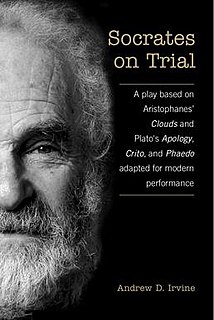 W
WSocrates on Trial is a play depicting the life and death of the ancient Greek philosopher Socrates. It tells the story of how Socrates was put on trial for corrupting the youth of Athens and for failing to honour the city's gods. The play contains adaptations of several classic Greek works: the slapstick comedy, Clouds, written by Aristophanes and first performed in 423 BCE; the dramatic monologue, Apology, written by Plato to record the defence speech Socrates gave at his trial; and Plato's Crito and Phaedo, two dialogues describing the events leading to Socrates’ execution in 399 BCE. The play was written by Andrew David Irvine of the University of British Columbia and premiered by director Joan Bryans of Vital Spark Theatre Company in 2007 at the Chan Centre for the Performing Arts in Vancouver.
 W
WThe Suppliants, also called The Suppliant Maidens, The Suppliant Women, or Supplices is a play by Aeschylus. It was probably first performed "only a few years previous to the Orestea, which was brought out 458 BC." It seems to be the first play in a tetralogy, sometimes referred to as the Danaid Tetralogy, which probably included the lost plays The Egyptians, and The Daughters of Danaus, and the satyr play Amymone. It was long thought to be the earliest surviving play by Aeschylus due to the relatively anachronistic function of the chorus as the protagonist of the drama. However, evidence discovered in the mid-20th century shows it one of Aeschylus' last plays, definitely after The Persians and possibly after Seven Against Thebes."Those at least who judge by the style, the simplicity of the plot, the paucity of the characters, and the predominance of choric action, will be reluctant to believe that the Suppliants was composed more than ten years after the Prometheus, Persians, and Seven against Thebes. It may be remarked, though not as an evidence of date, that the play is rather a melodrama than a tragedy. It ends happily, and has no other claim to the latter title than from the pathos excited and sustained by the helpless condition of the fugitive maidens in a foreign land. On the whole, it is rather a good play; and though it has obtained a bad name among scholars on the score of its many corruptions, yet there is a grace and a dignity in the choruses, and a general tenderness, virtue, and artlessness in the characters, that impart a very pleasing tone to the whole composition."
 W
WThe Suppliants, also called The Suppliant Women, first performed in 423 BC, is an ancient Greek play by Euripides.
 W
WThesmophoriazusae, or Women at the Thesmophoria, is one of eleven surviving plays by Aristophanes. It was first produced in 411 BC, probably at the City Dionysia. The play's focuses include the subversive role of women in a male-dominated society; the vanity of contemporary poets, such as the tragic playwrights Euripides and Agathon; and the shameless, enterprising vulgarity of an ordinary Athenian, as represented in this play by the protagonist, Mnesilochus. The work is also notable for Aristophanes' free adaptation of key structural elements of Old Comedy and for the absence of the anti-populist and anti-war comments that pepper his earlier work. It was produced in the same year as Lysistrata, another play with sexual themes.
 W
WTimon of Athens is a play by William Shakespeare, probably written in collaboration with Thomas Middleton in about 1605–1606, which was published in the First Folio in 1623. It is about the fortunes of an Athenian named Timon. The central character is a beloved citizen of Athens who through tremendous generosity spends his entire fortune on corrupt hangers-on only interested in getting the next payout.
 W
WTroilus and Cressida is a tragedy by William Shakespeare, believed to have been written in 1602. It was described by Frederick S. Boas as one of Shakespeare's problem plays. The play ends on a very bleak note with the death of the noble Trojan Hector and destruction of the love between Troilus and Cressida. The work has in recent years "stimulated exceptionally lively critical debate".
 W
WThe Trojan Women, also translated as The Women of Troy, and also known by its transliterated Greek title Troades, is a tragedy by the Greek playwright Euripides. Produced in 415 BC during the Peloponnesian War, it is often considered a commentary on the capture of the Aegean island of Melos and the subsequent slaughter and subjugation of its populace by the Athenians earlier that year (see History of Milos). 415 BC was also the year of the scandalous desecration of the hermai and the Athenians' second expedition to Sicily, events which may also have influenced the author.
 W
WThe Two Noble Kinsmen is a Jacobean tragicomedy, first published in 1634 and attributed jointly to John Fletcher and William Shakespeare. Its plot derives from "The Knight's Tale" in Geoffrey Chaucer's The Canterbury Tales, which had already been dramatised at least twice before. This play is believed to have been William Shakespeare's final play before he retired to Stratford-Upon-Avon and died three years later.
 W
WThe Wasps is the fourth in chronological order of the eleven surviving plays by Aristophanes, the master of an ancient genre of drama called 'Old Comedy'. It was produced at the Lenaia festival in 422 BC, a time when Athens was enjoying a brief respite from the Peloponnesian War following a one-year truce with Sparta.
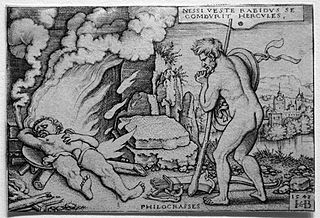 W
WWomen of Trachis or The Trachiniae c. 450–425 BC, is an Athenian tragedy by Sophocles.